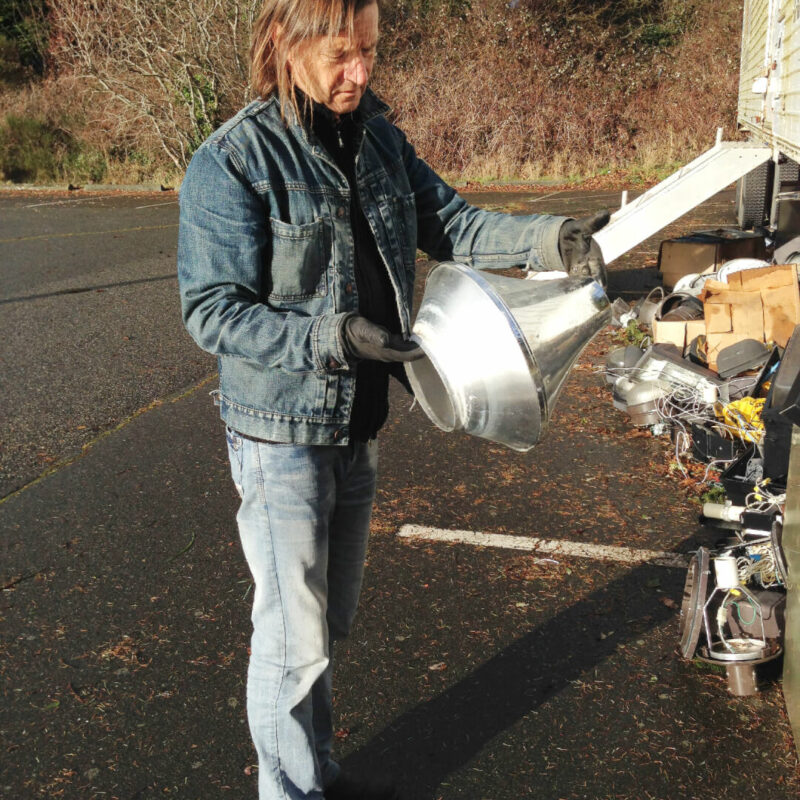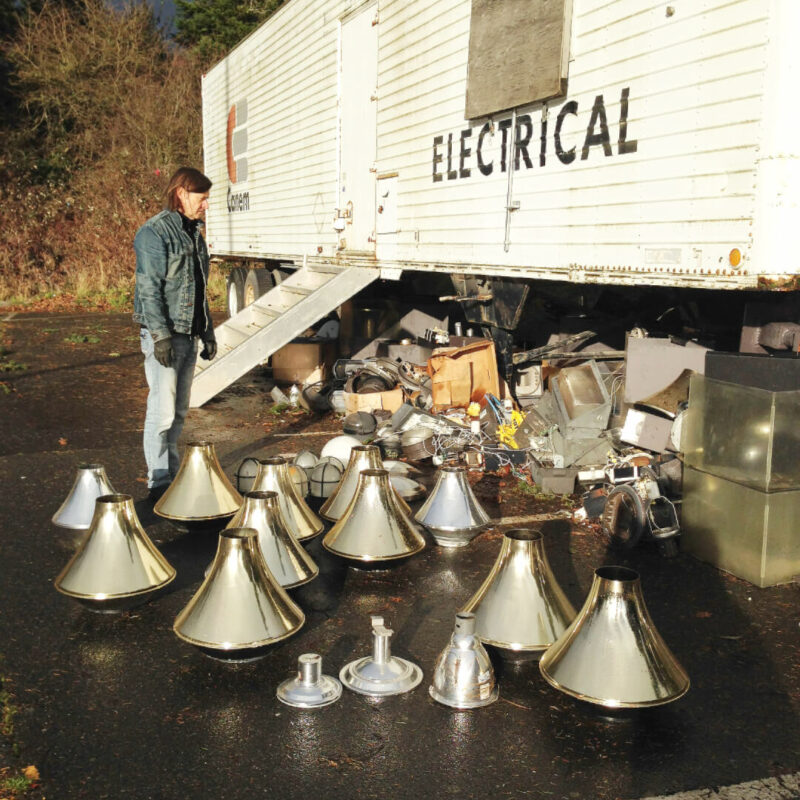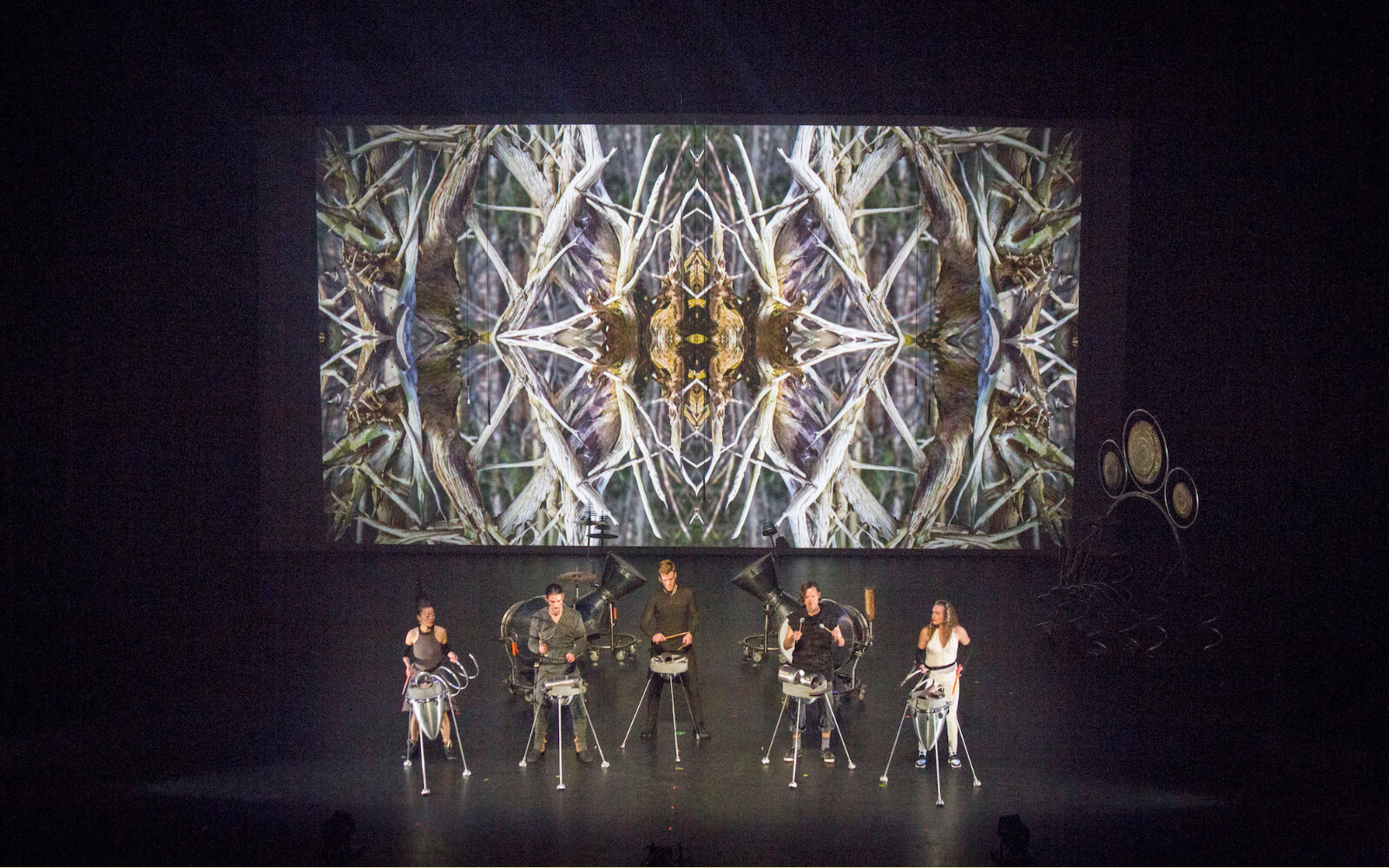By Cam Delisle
Just hours before igniting the Commodore Ballroom stage, the R&B trio unpack the realities of touring, influence, and fan-fuelled evolution.
Scrap Arts Music have been creating avant-garde sonic worlds with one-of-a-kind instruments built by Gregory Kozak since he and Justine Murdy founded the project in 1998. As the ensemble’s name suggests, every instrument they use is made from recycled materials. Originally formed in Vancouver, Scrap Arts Music is now based in Victoria where they’re preparing to self-release their third album, Children of Metropolis. Playful and inquisitive, the percussion-heavy album is wholly exhilarating and unbound by genre.
Children of Metropolis has more than enough merit to stand as a lone record, but it’s part of an expansive multi-disciplinary project. The album soundtracks a film of the same name based on German director Fritz Lang’s two-and-a-half-hour movie, 1927’s Metropolis. Lang’s sci-fi epic was one of the most technologically advanced films of its time, and remains prescient in its examination of the rise of tech and its confluence with humanity.
“We’ve gone 20 years in the future from that end point,” Murdy tells RANGE of their movie. Shot in 16mm black and white film and co-written by Kozak, Murdy, and Andrew Struthers, it picks up after Metropolis’ cataclysmic ending, imagining what becomes of the denizens of a vast modern city destroyed by human-driven disaster.


Scrap Arts Music recorded Children of Metropolis mostly live in Kozak’s studio with a cast of performers including himself, Murdy, Malcolm Shoolbraid, Spencer Cole, Chris Blaber, and Alex Campbell. The group spent two-and-a-half weeks experimenting with salvaged materials that Kozak bent, welded, and hammered into instruments, with Alex Gamble serving as recording engineer and mixer along with Kozak and Cole.
On Children of Metropolis, Kozak turned airplane parts into four-stringed instruments. He fashioned hand drums from aluminum parking lot lamp shades. To create a range of bell sounds, he cut at least 20 howitzer artillery shells from the Vietnam War, sourced from “the largest military surplus store you’ll ever see” in Utah, into various lengths. “There’s an aisle on the righthand side that’s all the military surplus that will destroy you: missiles, tanks, bullets, rockets. On the other side is all the bandages and hospital stuff and gurneys and defibrillators,” Kozak says. “Stuff to put you back together,” Murdy quips.

Gregory Kozak is holding a parking lot shade from Camosun College. These shades were repurposed by the group as “Dervish Drums” and were featured in “Hot Dog Hands” and “Five Numbers” on their latest recording.
“There’s something wonderful about grabbing a piece of metal, or a piece of a fish boat or a pulp mill – something humans have already tampered with and molded because it’s got some essence of some spirit in it,” Kozak gushes about Scrap Arts Music’s approach. People don’t often reflect on the provenance of every-day objects, but for Kozak, his instruments are daily reminders of the past. “I’m always living in the world that this stuff came from.”
Scrap Arts Music’s live show features more than 145 mobile sculptural instruments. “This is quite a physical show. There’s a lot of pumpin’, jumpin’ choreography,” Kozak says. He likens Murdy to an architect who envisions how all the pieces will fit together. “A lot of consideration goes into how it looks for the ensemble to perform a piece and then how they transition from one piece from the next,” she explains. For the shows supporting Children of Metropolis, however, the ensemble will perform on sculptural instruments in front of a cyclorama onto which they will project their film.

Whatever form Scrap Arts Music’s live show takes, it’s always a spectacle. But they group is about far more than just entertainment. Kozak commits himself to ensuring that Scrap Arts Music is as green as possible, sourcing the past to move forward as sustainably as they can. But he’s aware that his chosen vocation comes with limitations.
“I still have to step into a gas-consuming truck and blow exhaust fumes across North America,” Kozak acknowledges. “As humans, we need to access the materials of the planet, but there has to be a sense of responsibility.”
Every day, Kozak asks himself, “What is it we really need, and what is it we’re throwing away? What are we calling garbage, and are we responsible for that as individuals? It’s like a meditation. Maybe this is the little mantra we have to walk around with.”
With Scrap Arts Music, Kozak and Murdy lead by example. “I’m hoping other people look at Scrap Arts Music and go, ‘How come there’s not an invented instrument ensemble in every frickin’ city in the world?’” One way Kozak pays it forward is by hosting workshops, often for grade school classrooms. “Example is the best way to show people how to do things,” he says, aware that no one likes being preached to. “If people are curious about what I’m doing, I’m more than happy to share.”
Kozak is grateful to have the resources to work on his music, “but coupled with that comes a real sense of having to show that appreciation somehow. I owe that.”
By Cam Delisle
Just hours before igniting the Commodore Ballroom stage, the R&B trio unpack the realities of touring, influence, and fan-fuelled evolution.
By Stephan Boissonneault
On her debut solo album, the songwriter captures the textures of an ever-shifting city, blending punk, synth, and zine culture into something defiantly personal.
By Madeline Lines
Calgary’s Jennifer Crighton re-emerges from her creative cave with a lush album that celebrates presence, play, and the power of remembering.